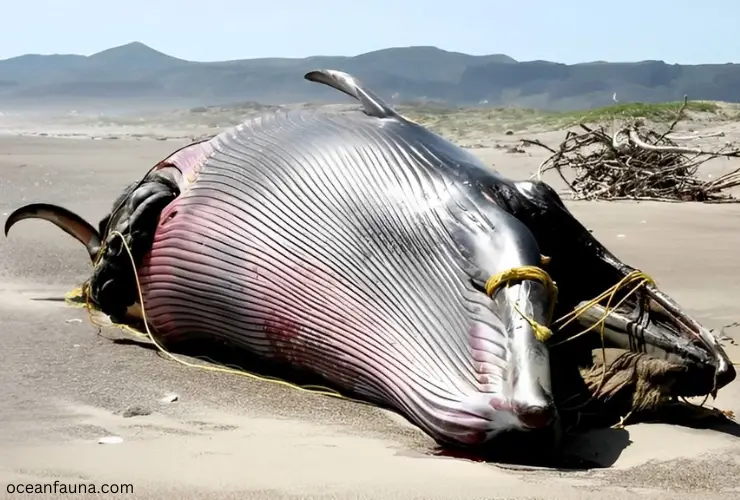Whales do not typically explode just after they die. After a certain period, when the whale’s body starts to decompose, gases are produced, which can cause a buildup of pressure inside. If the buildup is large enough, it can cause an explosion in some cases.
In this article, I will discuss this issue more scientifically. To know why a whale may explode, understand the underlying physiology of this magnificent creature.
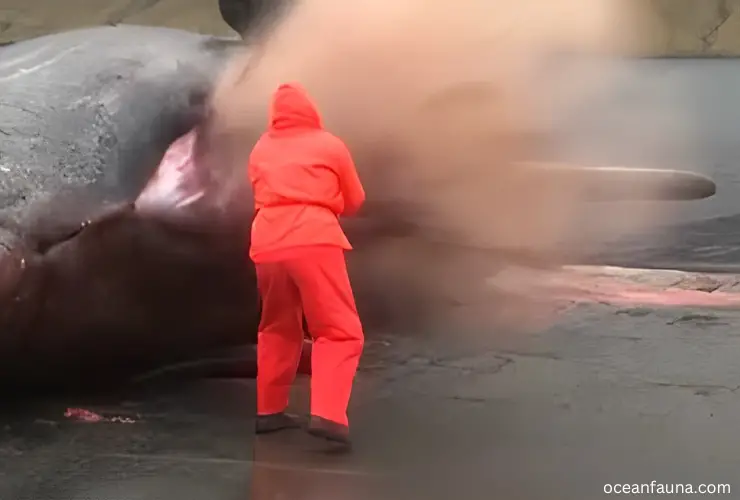
Does a Whale Explode When It Dies?
Yes. After the death of a whale, its body starts to decompose. Then gases such as methane and hydrogen sulfide begin to build up inside the carcass. If the whale is left in the water, these gases can escape through the mouth and anus without causing any harm.
However, the gas buildup can become dangerous if the whale strands itself onshore. The pressure from the trapped gas can cause the whale to explode, sending body parts flying up to several hundred feet away. This has happened multiple times in the past, causing damage to nearby property and posing a danger to bystanders.
Why Do Whales Explode When They Die? [Detailed Explanation]
When a whale dies, the bacteria in its gut quickly begin to multiply and break down the blubber and fatty tissues. This produces large quantities of methane and hydrogen sulfide gas, which can build up inside the whale’s body and cause a pressure buildup that may lead to an explosion.
The amount of gas that is produced can be immense – up to several tons – and the longer the body remains intact, the greater the risk of an explosion.
The physiology behind this phenomenon lies in the unique nature of whale blubber. Whales are known for their thick layer of blubber, which can be up to 30 inches thick in some species.
This blubber is primarily composed of fat and is used by the whale for insulation and as an energy reserve during long migrations. However, when a whale dies, this fat becomes a liability, as bacteria easily break it down and can produce large amounts of gas.
The gases produced during decomposition are primarily methane and hydrogen sulfide, which are both highly flammable and explosive. Methane is particularly dangerous as it is lighter than air and can accumulate in the upper body cavity of the whale.
If the gas is not vented, it can build up pressure until the whale’s body ruptures, resulting in an explosive release of gas and fluids.
In addition to the risk of explosion, the release of these gases can also pose a health hazard to people and animals in the vicinity. The rotten egg smell of hydrogen sulfide is particularly unpleasant and can cause headaches, nausea, and other health problems.
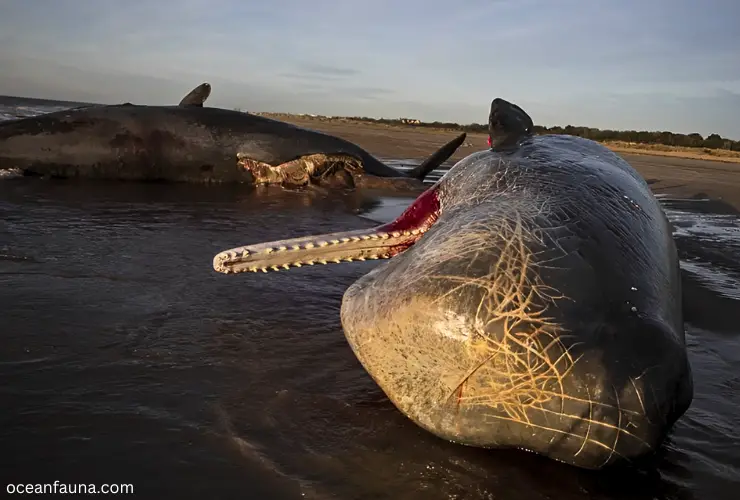
How Long Does It Take for a Whale to Explode After Death?
The amount of time it takes for a whale to explode after death depends on several factors, including the size of the whale, the environmental conditions it is exposed to, and the presence or absence of scavengers that may consume the body before it has a chance to explode.
Generally, it can take a few days to several weeks for a whale to explode after death. Smaller whales may decompose more quickly, while larger whales can take longer to break down, resulting in a longer period before an explosion occurs.
Interestingly, there have been instances where people have intentionally detonated the carcasses of dead whales to dispose of them. However, this practice is highly discouraged as it can be dangerous and cause harm to people and the environment.
Is It Normal for Dead Whales to Explode?
It is neither normal nor rare for dead whales to explode. Bacteria in the whales’ gut can produce methane gas in warmer climates. As the gas builds up, it can cause the whale’s body to rupture and explode. This phenomenon is known as “whale explosion.”
To avoid such situations, authorities either bury the carcass or tow it out to sea to allow it to decompose naturally. In one such incident in Taiwan in 2004, a dead sperm whale exploded while being transported, showering a nearby street with blood and whale guts.
While such occurrences are certainly not common, they do happen, and it’s always best to handle a dead whale with caution to prevent any such mishaps.
The gases can escape if the whale is left in the water before the explosion happens. If the whale becomes stranded on land or is subjected to extremely high temperatures, it poses a greater danger of exploding.
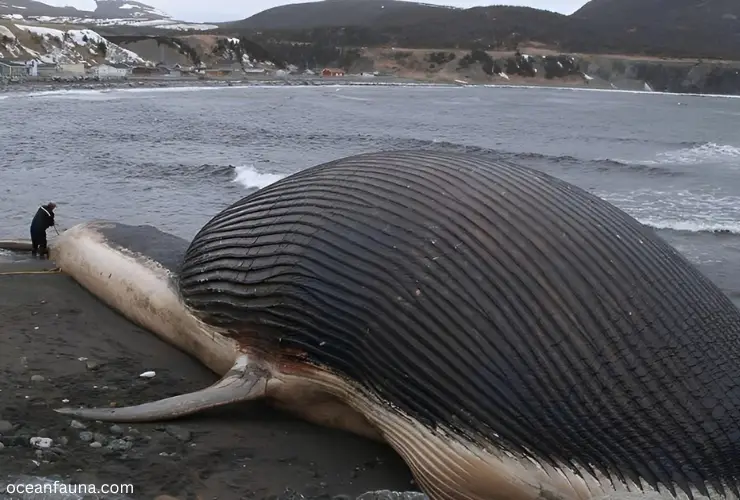
What Happens When the Dead Whales Explode?
When dead whales explode, it is not only a gruesome sight but can also pose a significant threat to the environment and nearby people. The buildup of gas inside the dead whale’s body causes it to inflate like a balloon. Eventually, the pressure becomes too much for the whale’s skin, and it ruptures, releasing a putrid concoction of gas, blood, and whale blubber.
The explosion can be deadly for anyone standing too close, as the sheer force of the blast can launch chunks of blubber and bones at great distances. There have also been reports of the entrails flying over 100 feet in the air.
In 1970, a dead whale in Oregon beached itself and blew up while a television news crew was filming. The resulting explosion left the anchor covered in whale remains, forcing the cameraman to dive into the water to avoid the debris.
However, the dangers of exploding whales don’t end there. The putrid mixture of gases and whale remains that spew everywhere can have serious environmental consequences.
In addition to the unpleasant smell that lingers for days, the bacteria that thrive on decomposing whale remains can deplete the oxygen supply in nearby waters, leading to the death of other marine life.
To mitigate the risks of exploding whales, experts typically try to intervene before the buildup of gases becomes too great. This can involve either safely towing the dead whale away from populated areas or cutting the animal apart to release the gas and prevent an explosion in cases where that isn’t feasible.
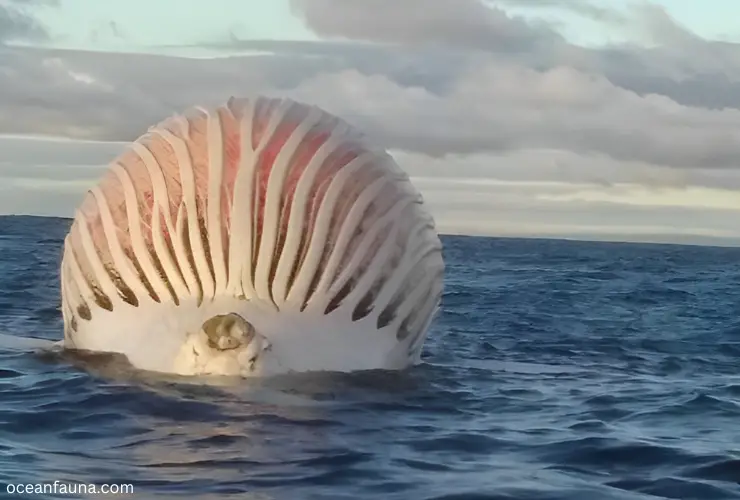
Why Shouldn’t You Touch a Dead Whale?
Beached whales can pose a severe risk to the health and safety of beachgoers, especially if they are dead. When a whale dies and is left to decompose, the gases produced as a result of the decomposition process become trapped inside the body.
It causes the whale to inflate like a balloon. This can lead to a dangerous buildup of pressure, which can cause the whale to explode with incredible force.
For this reason, beachgoers are strongly advised to stay far away from, and not touch, a deceased beached whale. The exploding gas and tissue can cause serious harm, even death, to anyone who is too close.
Additionally, the gases released from the decomposing whale can be toxic and pose a risk to humans and animals.
Another reason not to touch a dead whale is that it can be illegal to do so, as many species of whales are protected by law. Touching, removing, or interfering with a dead whale can result in heavy fines and imprisonment.
What Happens to a Whale When It Dies?
When a whale dies, it can sink to the bottom of the ocean floor, becoming an important food source for various deep-sea creatures. These whale carcasses, or whale falls, can support entire ecosystems of organisms that rely on the nutrients provided by the decomposing flesh.
As the body decomposes, different stages of decay create a range of niches for organisms that specialize in breaking down specific parts of the whale. Initially, scavengers such as hagfish and crabs consume the soft tissue within just a matter of months. Later, as the carcass becomes more decomposed, other types of creatures, such as worms and snails, move in to feed.
Whale falls can significantly impact their surrounding ecosystems, creating local hotspots of biodiversity that can persist for years. In fact, some species may even evolve unique adaptations to life around these massive food sources.
However, if a dead whale does not sink to the bottom and instead becomes stranded on shore, it can pose a potential danger. This is because the decomposition process, in this case, proceeds much faster due to exposure to air and sunlight.
In extreme cases, it may even explode due to gas buildup inside its body. Overall, a whale’s death significantly impacts its surrounding environment, whether it sinks or strands on shore.
Conclusion:
Hopefully, you understand why whales explode when they die. It’s all about the buildup of gas from decomposition. Dead whales can pose a serious risk to humans and the environment, so stay away from them in order to prevent any potential danger.
Additionally, some species of whales are protected by law, and touching a dead whale can result in heavy fines or even imprisonment. Lastly, whale falls create local hotspots of biodiversity that can persist for years, and their death provides a rich source of nutrients to deep-sea organisms.

